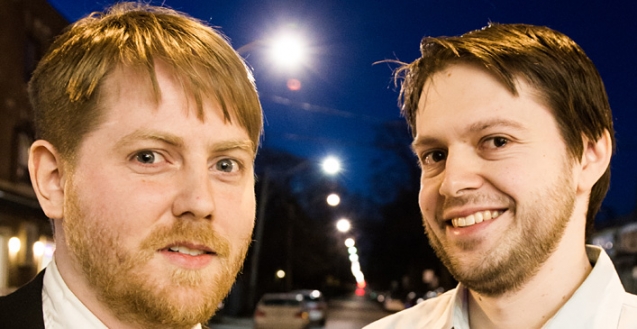David Tichauer may have just caught his big break.
After nearly a decade of writing, performing, and honing his craft, the comedian and McGill-graduate has received word that the CBC wants him and his creative partner, Ned Petrie, to turn their monthly live quiz show into an original television series.
“We’ve been doing [The Panel Show] live for the last four or five years for a handful of people, [and] maybe 10 people will show up—that’s on a good day—making no money,” Tichauer explained with a tone of playful self-deprecation. “But we just found out a few days ago that CBC ordered a pilot that we’re going to do in March, and hopefully we’re going to get it in their regular lineup, which would be crazy.”
The series centres on a panel of comedians riffing and answering questions about obscure and hilarious news stories. Petrie is the show’s host, and Tichauer is the show’s on-camera scorekeeper, chiming in during discussions and providing a mid-show interlude involving comically inaccurate film reviews.
It’s a huge development for the Toronto-born performer, who pursues comedy full-time with a part-time job as a tutor for high school students, a gig he owes to his undergraduate education. Tichauer explained that he was a focused student in university, and has since worked extensively as a scientific researcher—comedy came to Tichauer late in life.
“[Comedy at McGill] really wasn’t on my radar,” Tichauer recalled. “My thing was sports. I tried out for the [varsity] tennis team…did not get on. So I just played intramurals: Soccer, ball hockey, that kind of stuff.”
However, Tichauer did flex his comedy guns at one point in his tenure as an undergraduate, penning a satirical article for The McGill Daily.
“It was on George W. Bush about how he was bad—pretty original, I know,” he said. “It was right when they discovered there were no weapons of mass destruction, probably 2003, 2004. [….] He was just such a silly person, just ripe for comedy.”
After graduation though, Tichauer’s passion for humour began to emerge.
“I moved back to Toronto after university, and a friend of mine was taking classes at The Second City,” he explained. “She suggested to me that I take them because she thought I’d enjoy them. I was working in a research lab at the time, and I guess I felt like I wanted to be doing something a little more creative, something a little different. So I started taking classes—weekly improv classes at Second City—and I never stopped.
Tichauer eventually completed every level of classes offered at the prestigious comedy institute, including a one-year conservatory program in which students audition to work on a full-length revue sketch show. He met many funny people in the process, including Petrie.
“After the conservatory was over, we just kept on doing it, meeting on our own time, once a week as an independent sketch troupe,” he said. “That’s how it started.”
Out of this productive social network grew Straight Man, a web series—nominated in five categories at the 2014 Canadian Comedy Awards—which Tichauer starred in and co-wrote.
“Straight Man first started without me, with three other guys [from the sketch troupe] as an offshoot because one of them knew a producer who worked at some actual TV network,” Tichauer explained. “But after that, they brought me on because they wanted to change it and add more, so I ended up writing the web series, along with Ned.”
In Straight Man, Tichauer plays the most reasonable member of a bumbling three-man comedy troupe who have just received their first professional performing contract from a powerful but shady producer. On the night that the trio celebrates the producer’s generous offer, Tichauer’s character is hit in the head by a popped champagne cork, enduring head trauma that directly affects his ability to understand humour and irony. Essentially, he is rendered unfunny, just hours before signing the contract that will make him a star.
Although Tichauer claims that the premise for Straight Man was not born out of any haunting, recurring nightmare, he admits that banking on one’s own comedic appeal isn’t exactly the most surefire investment.
“[That premise] was totally just an analytical choice, based on what we thought would be the worst thing that could happen,” said Tichauer. “That being said, it is a thing that every comedian thinks and worries about, that it’s just not going to work someday. [The ability to be funny] seems like a very ephemeral thing. It is a fear, something that every comedian thinks and worries about.”
Through years of constant performance and disciplined writing, Tichauer has reached a point of great opportunity. The work he produces in the next few months could catapult him to national recognition and prominence. Let’s just hope that he doesn’t celebrate with that bottle of champagne too early.









